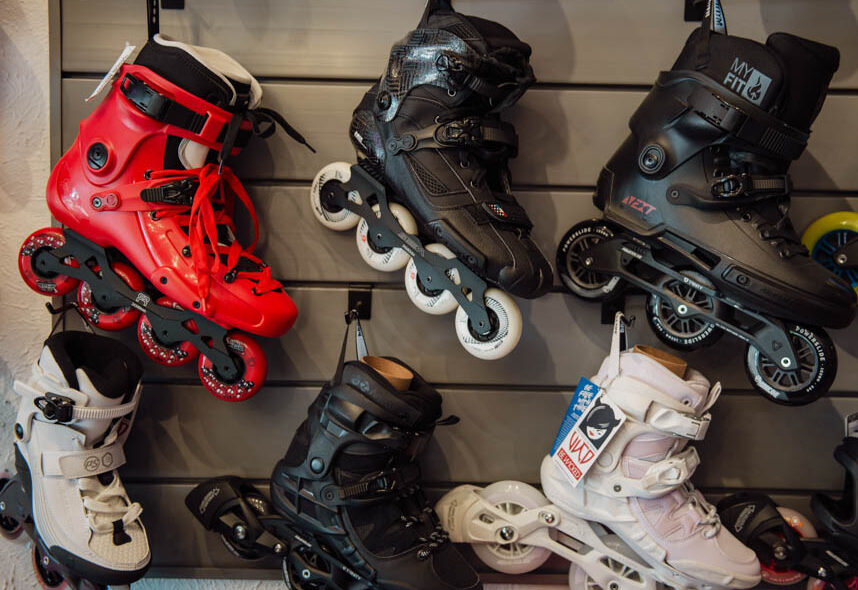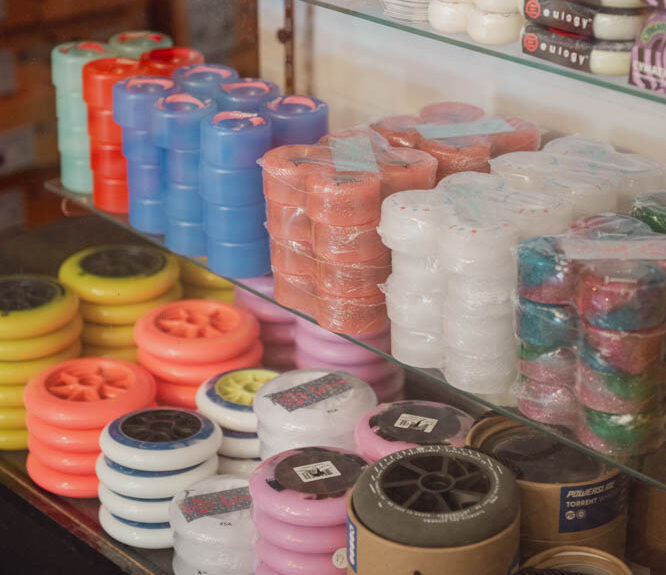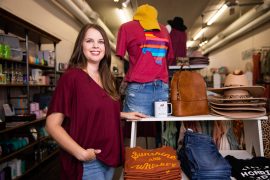Fritz Peitzner is roller skate royalty.
“There was a skatepark with a shop and everything you needed just 10 minutes from my home when I was a kid and picking up rollerblading,” he says. “It was called Eisenbergs Skatepark and it was the home for skaters.”
Eisenbergs crammed a heap of ramps and rails into a small block in Downtown Plano, complete with a skate shop and arcade just walking, or rolling, distance away. Peitzner recalls teaching lessons in the park at a young age.
In 2012, owners Essi Babaahmadi and Vicki Eisenberg were pushed out of the location in favor of a mixed-use development. Plano skaters didn’t have a home.
Peitzner knew the heyday of Eisenbergs like no other, and set out to create a hub of his own in its absence. Carriers, his own skate and apparel brand, was born out of his garage in 2014. In 2018, Peitzner bought a van to sell out of. By the end of the year, he had his first brick-and-mortar location right back in Downtown Plano. Recently, he launched Cymatics, a roller skating wheel brand that Carriers sells in-store.
The city’s skaters suddenly had an orbit, gravitating to Carriers until the brand became big enough to begin sponsoring skaters through competitions around the country. One of the first Carriers-sponsored skaters was Hunter Grimm, who Peitzner first met in 2007.
“He was still a beginner and much younger,” Peitzner recalls. “But he had a drive to him that most of the younger skaters in our area did not have.”
Grimm was a teenager playing baseball and football at the time. He specialized in rollerblading.

Roller skating involves the use of skates with four wheels, arranged into two opposite rows.
Rollerblading, also known as inline skating involves the use of skates with a single row of three wheels.
“Rollerblading was always the thing where I could get away from those competitive sports and not have a coach always yelling,” Grimm says. “I could just go skate by myself, zone out and kind of teach myself.”

Peitzner didn’t think much of Grimm at the time, but remained acquainted with Grimm when he’d see him around at parks.
“After a few years we all noticed how much better he was getting and his personality really began to shine,” Peitzner says. “Hunter is a very talented skater with an amazing personality, he is the perfect person to sponsor for events.”
Grimm represented Carriers at events around the country, even giving lessons out of the shop for a short time.
“The rollerblading industry is underground right now,” he says. “It’s been hard to make a living so a lot of people work normal jobs and return to their passion project.”
In 2018, Grimm was doing just that. His time outside of the parks was spent waiting tables in Colorado. One day, he received a call that would change his life. Cirque du Soleil was putting together a show on ice, and he was offered a role in it.
“I was finally going to be able to make my passion a career,” Grimm says.
It was thrilling news, but it also meant a total upheaval of his life.
“I was sent up for seven weeks to do my training,” Grimm says. “My day would look like four hours on ice in the morning, then you come back to have lunch, then go to choreography, then you go to makeup class and acting class after that.”
Once his brutal training schedule was complete, Grimm began to perform and learn the subtleties of ice skating.
“It’s a little different on ice,” he says. “With the sharp turns we take and kind of acting and giving attention to the crowd. It’s new. We’re just rollerbladers that haven’t really performed and stuff.”
Grimm took specialized classes for ice skating, a far cry away from his experience growing up with rollerblading.
“Once I got into rollerblading that was all kind of self taught,” he says. “It wasn’t as accessible to find YouTube videos and much about the rollerblading industry as it is today.”
“That’s one thing I love about ice skating,” says David Lewitt, a local skating content creator. “There are structured organizations and skating clubs, written curriculum, group lessons and many skilled coaches that offer private lessons to help you work your way through the curriculum.”

Lewitt runs a YouTube channel called Deez Skates, where he goes out of his way to reach across the aisle and include content relating to each skating discipline.
“These things make ice skating less accessible to many people, and the beauty of roller and inline skating is that they’re accessible to people of pretty much every social class,” Lewitt says. “It costs much less to run a roller rink than it does an ice rink and you can roller skate anywhere it’s allowed. Inside or outside.”
Lewitt has spent his life doing just that.
“I’ve been roller skating basically as long as I’ve been walking,” he says. “My mother was a skater in the ‘60s, but my grandmother wouldn’t allow it because she was scared my mom would get injured. When my mom got her driver’s license in high school she would go herself. She loved skating, but there were small kids there that were way better at it than she was. I guess over time she got pretty resentful that her mom’s fears had held her back so much. As soon as she had a kid she was going to make them learn how to skate.”
Lewitt says his mother started strapping skates on his feet and taking him on walks as early as 2 years old. Now, he’s one of the community’s prominent influencers.
“There was a time where I could go to a roller rink, strap on my skates and roll around all night and not talk to anyone,” he says. “Now, I can’t go anywhere without someone recognizing me and it’s made me feel more accountable.”
That accountability comes with the territory. Lewitt continues to put himself out there as a leader in a small, but tight-knit roller skating community.
“I want to be a good example to people of all ages,” he says. “Whether they love skating already or are just getting interested in it.”
Grimm has experienced the craft as a beginner and as a performer at the highest level. To him, its appeal is universal.
“Learn to love the simplicity of it,” he says. “Just get in your own zone and ride. It’s almost like a meditation.”





